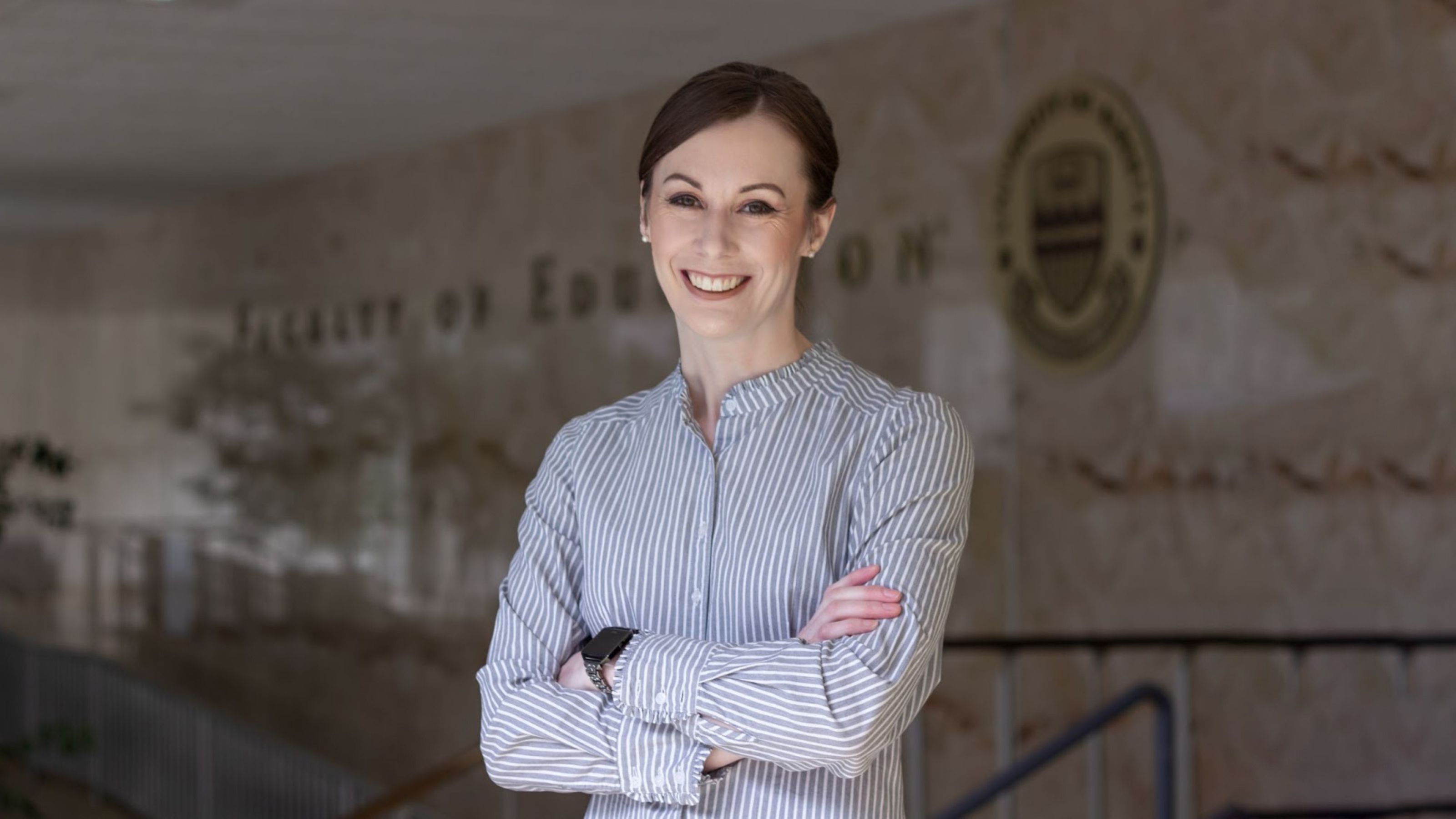Embracing her autistic identity has enabled Dr. Heather Brown, associate professor in the Faculty of Education, to enrich her teaching, research, and overall contribution to academia and, in turn, improve the lives of other autistic people.
In this week’s spotlight, Heather shares her experiences and how shifting deficit-based narratives can positively impact how autistic people live their lives and engage with the world.
How do you describe your work to people who don’t work in your field?
I am an autistic researcher who is deeply committed to enhancing the academic achievement and overall well-being of autistic children, youth, and adults. My community-based participatory research is focused on empowering autistic individuals to embrace their neurodiversity confidently and better understand the key factors contributing to their well-being in various aspects of life, such as at home, work and school.
What’s one big problem you want to solve through your work?
Considering that the conditions encompassing our daily lives — our living environments, workplaces, educational settings and personal growth — hold significant sway over our well-being, it is not surprising that numerous challenges faced by autistic individuals stem from societal factors. These challenges often involve discrimination against autistic job-seekers and insufficient opportunities for meaningful social and romantic connections, as well as experiences of social isolation and bullying. In my view, the utmost priority lies in fostering autism-inclusive, neuro-affirming and accessible spaces, programs and understanding within our communities.
By shifting the prevailing autism narrative away from notions of tragedy, pity, and fear, and embracing a more positive and destigmatizing perspective that highlights strengths and potentials, we can significantly reduce discrimination and foster greater inclusion and equality for autistic individuals in all aspects of their physical, social, and attitudinal environments. This positive change will positively impact how autistic people live their lives and engage with the world.
What does the word “innovation” mean to you?
To me, innovation embodies the spirit of creative problem-solving, pushing boundaries, and breaking new ground. It's about challenging conventional thinking and seeking novel approaches to address existing challenges or even anticipating future needs. Innovation is not limited to technology or products; it can also encompass new ideas, processes and ways of thinking that bring about positive change.
As someone who has navigated academia as an openly multiply-neurodivergent professor (autism, ADHD), starting from my graduate school days, I have embraced my neurodivergent identity, recognizing that it brings unique perspectives and strengths to my work and interactions. Innovation is not just about advancing my field of study, but also about advocating for a world that embraces diversity and provides equal opportunities for all individuals. I strive to challenge misconceptions and stereotypes, paving the way for a narrative that empowers and celebrates the diversity within the autism community. By emphasizing our strengths and positive attributes, we can build bridges of understanding and foster a supportive environment that enables everyone to contribute their talents and abilities to society.
What’s been your biggest a-ha moment — in life or work — so far?
My most significant "a-ha" moment came when I finally let go of the exhausting pursuit of trying to pass as neurotypical and wholeheartedly embraced my autistic identity. It was a transformative experience that allowed me to flourish as a professor. By being open and transparent about my challenges, I not only fostered understanding and empathy in my academic environment but also showcased how those very challenges that might be perceived as barriers in one context are actually incredible strengths in another. Embracing my neurodivergent identity has enabled me to offer unique perspectives, enhanced attention to detail, and an innate ability to think outside the box, all of which significantly enrich my teaching, research, and overall contribution to academia. Through this revelation, I have found a newfound sense of authenticity and confidence, inspiring others to embrace their identities fully and contribute their exceptional strengths to their respective fields.
How do you or your team come up with your best ideas?
At the core of our idea generation process, my team and I employ a comprehensive approach that draws inspiration from various avenues. Reading numerous sources and extensively researching diverse materials provide us with a strong foundation of knowledge. However, we believe that true innovation comes from collaborative efforts. Engaging in meaningful conversations with experts from diverse fields broadens our perspective and enriches our thinking. But it doesn't stop there; we go further by actively seeking input from community members, including those from the autistic community who might not have research training. By embracing their unique insights and experiences, we promote inclusivity and ensure that decisions are made collectively. Sharing power and decision-making is a key aspect of our approach, allowing us to harness the strengths of each team member, regardless of their background or expertise. This collaborative and inclusive process empowers us to refine and prioritize our best strategies for moving forward on any given project, resulting in innovative and impactful outcomes.
What’s your favourite thing about working at the U of A?
My favorite thing about working at the U of A is undoubtedly the incredible people I have the privilege of collaborating with. The supportive and inspiring atmosphere created by my colleagues fosters an environment of innovation and camaraderie. One of my most cherished collaborations is with Sandy Thompson Hodgetts, an Occupational Therapist in the Faculty of Rehabilitation Medicine, with whom I've worked on numerous tri-council funded projects. For example, together, we have delved into exploring self-determination among autistic adults, both with and without intellectual disabilities, shedding light on critical aspects of their lives, and also promoting awareness of neurodiversity affirming practices for Autistic people.
I am particularly grateful for the continuous and dedicated support I receive from Shane Klein and James Park in Technology in Education. They have consistently been willing to assist me with media interviews and address any technological challenges that arise. Recently, they enthusiastically stepped up to provide invaluable guidance to participants in creating digital stories, which has significantly enhanced the impact of our research and the learning experience for those involved. Moreover, the remarkable dedication of Dianne Johnson and Oliver Rossier has been instrumental as we work to launch two new tri-council funded projects. Their tireless efforts in helping me to plan and organize the complex details involved in coordinating extensive national and international collaborations of researchers and students have been invaluable. Working with these amazing individuals at U of A has made my academic journey exceptionally rewarding and fulfilling, and I am truly grateful for their unwavering support and collaboration.
The U of A promises to Lead with Purpose as we build a university for tomorrow. How does your work help you lead with purpose?
I have been deliberate in reaching out to the community in a range of advocacy roles, leading by example through research and mentorship, and establishing a program of work that is informed by concerns related to equity, diversity, inclusion, and belonging. My experiences include a track record of exemplary community building, advocacy, leadership, teaching and supervision, in addition to successful grant funding. The impact of my research has reached knowledge users in the autism community, policymakers, and scholars globally. I collaborate closely with neurodiverse adults to address real-world problems and ensure that the voices of autistic and other neurodiverse people are respected and valued throughout the research process. My advocacy efforts extend to the broader autism community, where I conduct research, provide mentorship, and make transformative contributions to local, national, and international communities. For example, I am the Principal Investigator for the Campus Belonging Network, an extensive network of partners committed to improving belonging, access and success for all autistic post-secondary students in Canada. Collectively, we address the concerning reality that the majority of Canadian autistic post-secondary students, approximately 6,000 annually, do not complete their education and consequently become disconnected from campus life. Collectively, our team brings expertise in PS education, system change, and national strategy development. No matter what I am working on, I am committed to fostering EDI, empowering autistic adults, and creating opportunities that pave the way for a more inclusive and impactful landscape of autism research.

About Heather
Heather's research program is committed to producing and disseminating accurate knowledge about supporting the academic achievement and overall wellbeing of autistic children, youth, and adults. She is most interested in strength-based learning approaches in autism – practices that advise us to move beyond only targeting children’s deficits, and instead utilize environmental supports to strengthen function-focused abilities (Mossman-Steiner & Gengoux, 2018) as these approaches can “empower autistic people to be happy and live fulfilled lives” (Urbanowicz et al., 2019, p. 88). By studying the ways in which autistic youth learn, Heather's research will inform the creation of targeted supports for autistic students with the goal of bridging the gap between academic success in childhood and successful participation in society in adulthood.
Innovator Spotlight is a series that introduces you to a faculty or staff member whose discoveries, knowledge and ideas are driving innovation.
Do you know someone at the U of A who is transforming ideas into remarkable realities? Maybe it’s you! We are interested in hearing from people who are helping shape the future, improving quality of life, driving economic growth and diversification and serving the public. We feature people working across all disciplines, whether they are accelerating solutions in energy, shaping the evolving landscape of artificial intelligence or forging new paths in health and Indigenous leadership.
Get in touch at blog@ualberta.ca.
